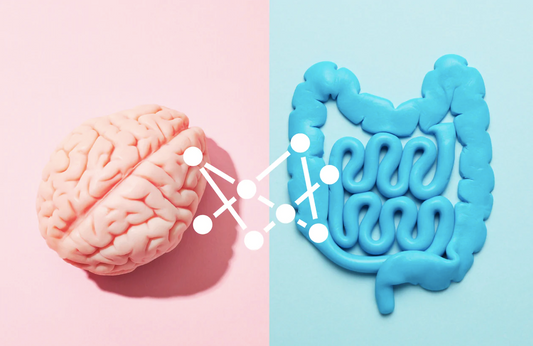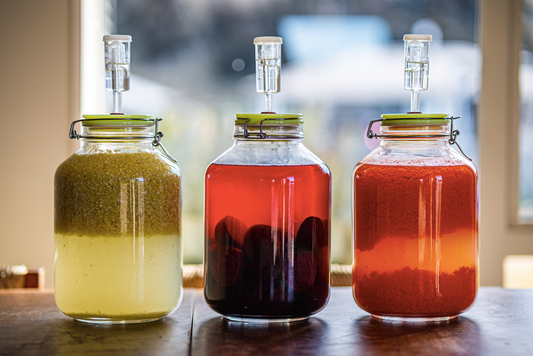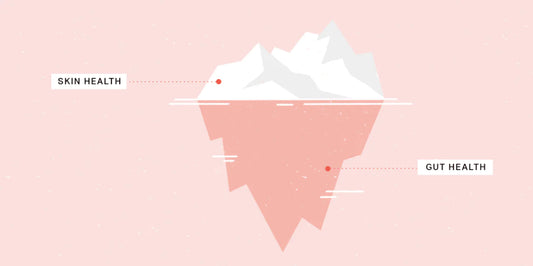Reflecting back on all of my pregnancy journeys, it’s still difficult to frame the experiences into words. A few that spring to mind immediately are; elation, excitement, nerves (and more nerves), a nine-month-long hormonal roller-coaster, and developing a deep appreciation for just how freaking amazing my body is to produce my darling mini-humans.
Every pregnancy journey is completely (and beautifully) unique, and as women, we’re all united in wanting to give our little ones the best start to life possible. That means what we do and how we look after our own health before conception is often just as important as our nutrition and health during pregnancy.
We are all becoming more aware of the importance of the microbiome. But did you know taking care of your gut is even more important during pregnancy?
After my pregnancy with little Clover, I became passionate about my own gut health during pregnancy and the role that plays in foetal development, and the development of my baby’s microbiome.
The role of the gut microbiome during pregnancy
So what is the gut microbiome? This refers to the trillions of microbes living in your gastrointestinal system supporting healthy digestion, your metabolism, mental health and boosting the immune system.
A baby’s first microbiome influence is that of mum’s microbiome. It was believed up until recently that infants were born with a sterile gut and were not exposed to microbes until they were born. But, new studies have found that there is actually an entire unique microbiome within the amniotic fluid & placenta.
With a balanced gut microbiome, you and your baby will be better able to absorb nutrients through the food you consume. Whether you’re currently pregnant or thinking of it, here are a few tips to help you foster a great gut microbiome for you and your baby.
Looking after your gut microbiome during pregnancy

A well functioning gut microbiome requires pre AND probiotics, and they come in many forms. Supplements, food-based fermented products, tonics and ferments. Each of these has a space and place in a healthy, happy gut.
Now, before you start aggressively Googling what supplements you should be taking and plan to dose up on probiotics, hear us out. The problem with probiotics and any oral gut supplement is that it can be immensely confusing to figure out which one to take.
Probiotics aren’t the end game
With probiotics, each strain has both a different function and benefit - which can be equally helpful and confusing. Ultimately, before taking any new supplement during pregnancy speak to your healthcare practitioner and follow their recommendations.
Finding a probiotic supplement that is safe (as per your health care professional) and effective can be helpful. But did you know that looking after the health of your gut & microbiome is more than just taking a supplement? Oh if only it were that simple!
Other than taking a probiotic supplement there are plenty of other things you can do to improve your gut health before and during your pregnancy.
Before you take supplements, consider letting food be thy (gut microbiome) medicine

The microbes in your gut thrive on high fibre diets. They ferment this fibre to spread and support a healthy colon. The recommendation is now SEVEN portions of vegetables and fruit every day.
For reference, a portion is approximately 80g or one large handful. So make sure you are loading up on your veges.
Refined grains like white bread and pasta and sugary snacks like chocolates, cakes and biscuits, are shown to encourage an imbalance in the microbiome.
So try to curb those cravings with healthier snack choices like vegetables, hummus, fruit, nuts, nut butters and whole-grain options. Easier said than done, we know!
On top of fibre, there are great food sources of probiotics including Kombucha, Kefir, Miso Soup, Apple Cider Vinegar and of course, Kvass.
Let’s discuss these further and look at their safety and appropriateness during pregnancy.
Fermented foods during pregnancy
Intake of fermented foods and probiotics during pregnancy and breastfeeding are believed to help improve the gut microbiome of both mum and baby. The general consensus amongst the health community is that fermented foods are safe to take- barring in women with underlying health issues.
This being said, it is SO important that before embarking on any dietary shifts you consult a health professional, particularly if you have any concerns or are looking for extra peace of mind.
Fermented foods like yoghurt, kefir, kimchi, and sauerkraut may help with your intake of vitamin K2, balance your gut bacteria, and reduce diarrhoea during pregnancy. Don’t feel like you need to cram a whole range of fermented foods into your diet to have a positive impact on your gut - small, positive changes and listening to your body are the most important things.
Remember - your journey is unique
During my pregnancies, I added in small quantities of probiotic foods - such as kimchi and sauerkraut - but mostly I focused on eating whole foods, keeping my diet varied and colourful and giving my body what it wanted.
It turned out what my body wanted was to fulfil a never-ending, insatiable craving for pickles, so I enjoyed fermenting, mass amounts of daikon radish (guilty), as well as drinking the brine.
Finally, I took our Clover Ferments tonics religiously every day - other than when my morning sickness was so bad I couldn’t keep anything down - and it was amazing to see the improvements to my gut health, whilst my body went through major changes in pregnancy.
I know I have said it before, but it’s so important to remember that both your pregnancy and gut health journey are unique; which means that what works best for your body will be unique to you too. Although, if you have pickle cravings that were as extreme as mine, I definitely want to hear about them!
Reducing your stress levels (yep - I know)
The gut-brain connection is real and stress has been scientifically shown to influence the health of the gastrointestinal tract and the diversity of your microbiome. Don’t be overly alarmed by this, as pregnancy (and being a mum!) can be a stressful period - and if it wasn’t for you I am officially jealous - but it is important to plan and make sure you are making time for yourself every day to unwind and relax.

- Get out of the house and get moving, a simple walk and fresh air can help reduce the stress experienced day-to-day. Staying active is not only good for your mental & physical health - and your bubbas, but it is also great for your gut.
Preliminary studies show exercise may help to increase beneficial gut bacteria populations. Move as much as possible, doing the best you can to make it a daily activity, even after the baby is born. - If possible, meal prep can help you integrate fermented foods into your diet when the stress of everyday life is piling up (hello bathtime, feeding toddlers, balancing family time). Meal prep helps take the pressure off cooking when your kids are asking for their 1000th snack.
- Try to integrate mindfulness and time to yourself. Easier said than done in a busy household, but something as simple as taking a long shower, or 20 extra minutes of ‘you time’ can help your stress levels, and by proxy- help your gut.
My strategies for keeping stress low through my pregnancies were through yoga, meditation and daily movement - but only types I really enjoyed. I didn’t see any point in doing activities that were supposed to ‘relax me’, but subconsciously stressed me out because they felt like what I should be doing, as opposed to what I wanted.
Try adding fermented foods to your daily life

With the pressures of daily life, it’s important to try and integrate fermented foods where you can, and in a way that works for you.
For many of our wonderful customers, they find the three simple shots of our Kvas tonics a day is a great way to integrate the fermented goodies into their gut (and lifestyle).
Whatever you’re looking to integrate into your lifestyle, don’t forget to start low & slow and trust your gut!
Thanks for reading! Stay tuned for our next blog post that explores the link between our gut health & skin!
Steph xx
Resources & References
Bereltsen RJ et al. Probiotic milk consumption in pregnancy and infancy and subsequent childhood allergic diseases. J Allerg Clin Immunol. 2014 ; 133, 165-171.
Didari T, Mozaffari S, Nikfar S, Abdollahi M. Effectiveness of probiotics in irritable bowel syndrome: Updated systematic review with meta-analysis. World J Gastroenterol 2015 Mar 14;21(10):3072–3084
Flint HJ. The impact of nutrition on the human microbiome. Nutr Rev 2012 Aug;70 Suppl 1:S10–3.
Greer F, Sicherer SH, Burks AW., (2008). Effects of Early Nutritional Interventions on the Development of Atopic Disease in Infants and Children: The Role of Maternal Dietary Restriction, Breastfeeding, Timing of Introduction of Complementary Foods, and Hydrolyzed Formulas.
Gupta, R., et al. (2007). “Time trends in allergic disorders in the UK.” Thorax. v62 (1).
Gwiazdowska D, Jus K, Jasnowska-Malecka J, Kluczynska K. The impact of polyphenols on Bifidobacterium growth. Acta Biochim Pol 2015;62(4):895–901.
NHS (20015). “5 a day portion sizes”. https://www.nhs.uk/live-well/eat-well/5-a-day/portion-sizes/
Round, JL and S. K. Mazmanian,.The gut microbiota shapes intestinal immune responses during health and disease. Nature Reviews Immunology, vol. 9, no. 5, pp. 313–323, 2009.
Edwards, S. M., Cunningham, S. A., Dunlop, A. L., & Corwin, E. J. (2017). The Maternal Gut Microbiome During Pregnancy. MCN. The American journal of maternal child nursing, 42(6), 310-317.
Nichols, L. (2018). Real Food For Pregnancy. Middletown, DE: Lily Nichols.




